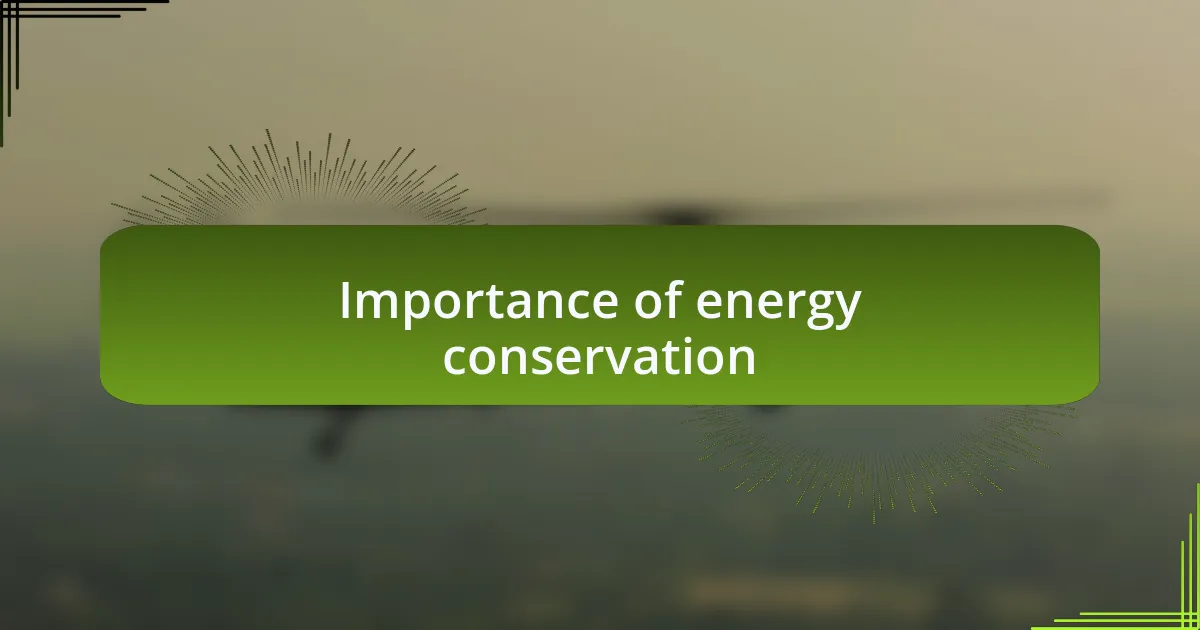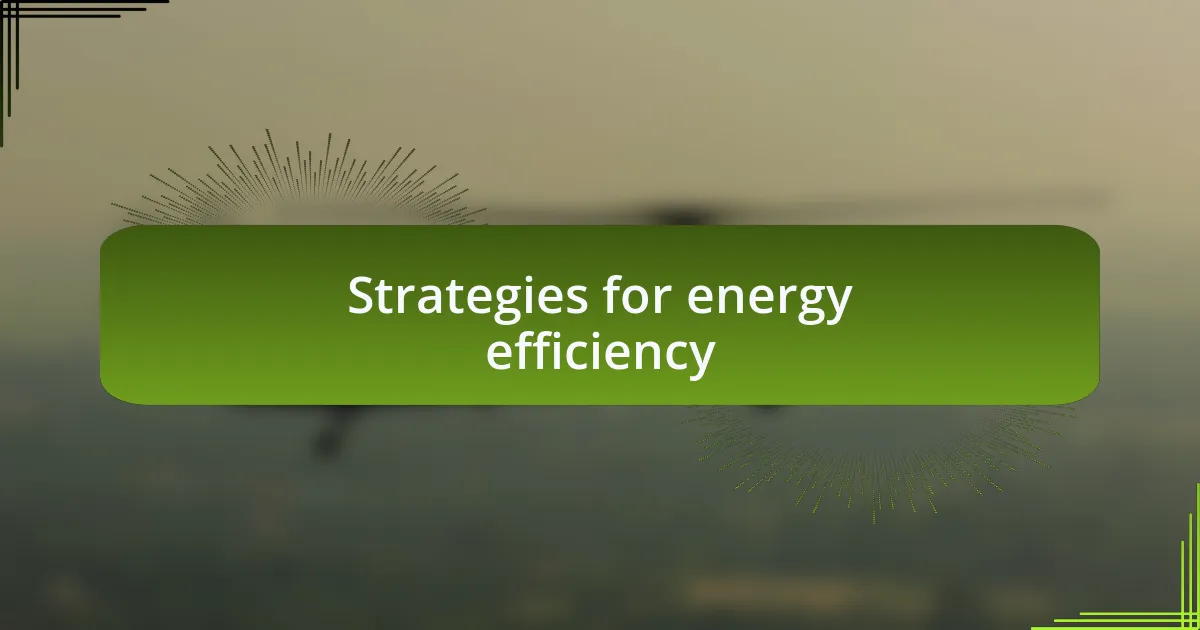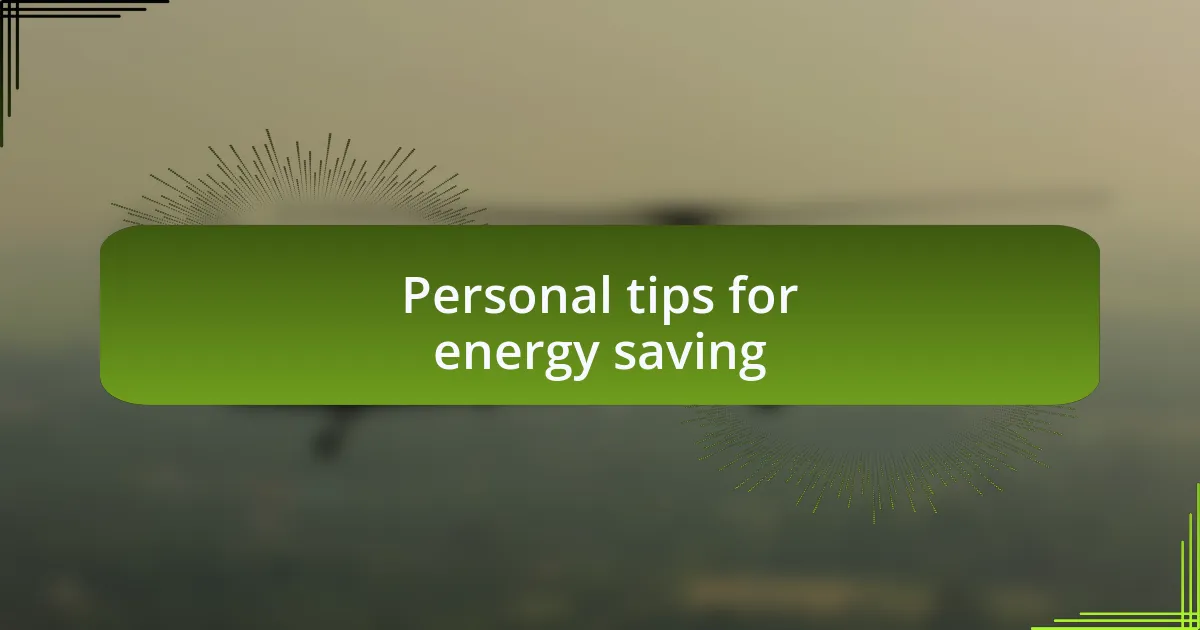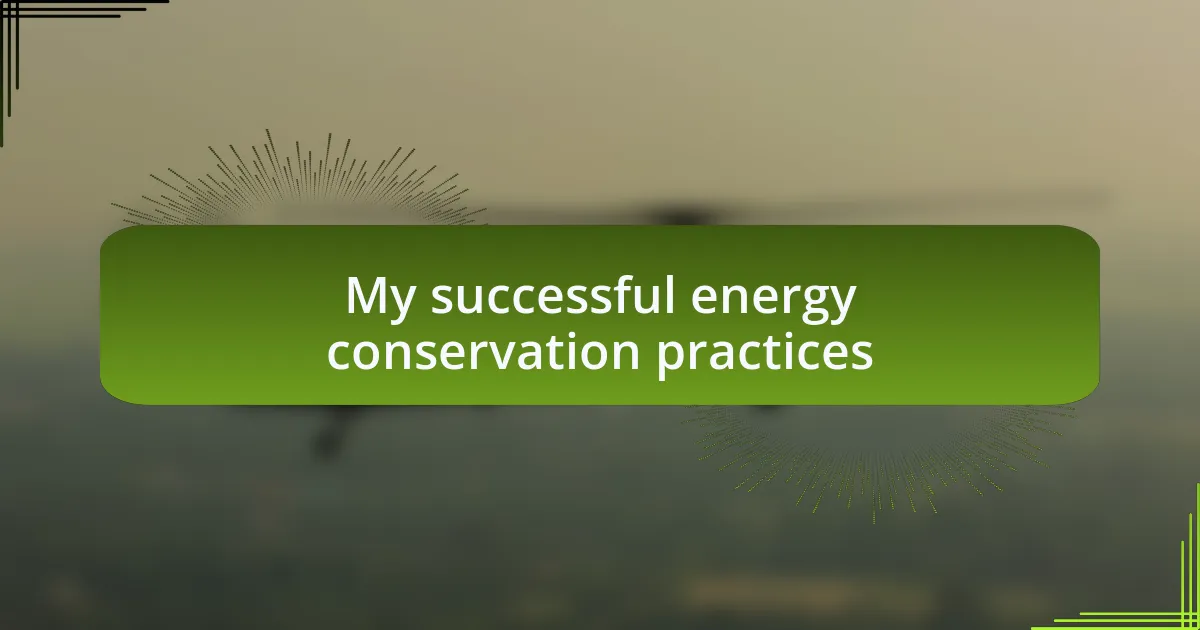Key takeaways:
- Energy conservation is vital for personal and planetary health, driving awareness and community action.
- Engineering technology enhances energy efficiency, influencing behavior and promoting sustainable practices.
- Practical strategies like smart technology integration and regular maintenance can significantly reduce energy consumption.
- Using energy monitoring tools empowers individuals to make informed decisions and adapt their habits for sustainability.

Understanding energy conservation
Energy conservation is more than just a technical term; it’s a vital practice that connects our daily lives to the health of our planet. I often reflect on how small changes, like turning off lights when leaving a room or unplugging devices that aren’t in use, have become second nature to me. Have you ever noticed how a simple action can lead to a greater awareness of our consumption?
One of my most memorable experiences with energy conservation came when I participated in a local initiative that encouraged residents to track their energy use. The sense of community involvement was exhilarating, and I distinctly remember the moment I realized that my individual efforts made a difference, not just in my bills but also in reducing our neighborhood’s overall footprint.
Understanding energy conservation also means recognizing its impact on future generations. My desire to leave a healthier world for my children drives my commitment to adopting energy-saving habits. If we take one step today, how many more will follow tomorrow? It’s a motivating thought that turns awareness into action.

Importance of energy conservation
Energy conservation plays a crucial role in mitigating climate change and reducing our reliance on finite resources. I recall a project from my college days where we designed an energy-efficient building. Witnessing the tangible benefits of our work, like the reduction in energy bills for the occupants, highlighted for me how our choices today influence energy consumption and environmental impact.
Moreover, conserving energy fosters innovation in technology. I often admire how advancements, like smart home devices, have transformed simple routines into sophisticated, energy-saving solutions. Have you ever used a programmable thermostat? Personally, I found it eye-opening to see how it automatically adjusted temperatures based on my schedule, demonstrating that technology can seamlessly support our efforts to conserve energy.
Finally, energy conservation isn’t just about saving resources; it’s about creating a sustainable future that embraces responsibility. I find that each time I consciously choose to save energy, I feel a deep sense of fulfillment. Isn’t it empowering to know that the small changes we make today can lead to a much larger impact tomorrow? In my experience, every action counts, igniting a sense of purpose in our collective journey toward sustainability.

Role of engineering technology
Engineering technology significantly contributes to energy conservation by designing systems that optimize resource use. For instance, during a recent project, my team developed an automated energy management system for a commercial building. I was amazed to see how such a solution not only streamlined operations but also led to a considerable reduction in energy waste.
In my view, the role of engineering technology extends beyond mere efficiency; it drives a mindset shift. I remember attending a workshop where innovative engineers showcased their renewable energy designs. It was inspiring to witness the enthusiasm and creativity that engineers brought to tackling energy challenges. Have you ever felt that spark of possibility when confronted with a significant problem? It’s this spirit of innovation that underpins our ability to reimagine energy use.
Moreover, engineering technology intersects beautifully with user behavior, promoting sustainable habits. When I installed energy-efficient appliances in my home, I found myself more conscious of my energy consumption. Doesn’t it feel gratifying to realize that technology can guide our choices toward a more sustainable lifestyle? This interplay between design and daily practices is what truly makes engineering technology a pivotal player in energy conservation.

Strategies for energy efficiency
In my experience, one of the most effective strategies for energy efficiency is embracing smart technology. A few months back, I decided to integrate smart thermostats and lighting into my home. The immediate feedback I received about my energy usage was eye-opening. Have you ever monitored your energy consumption? It’s fascinating how small adjustments can lead to big savings. By fine-tuning my settings based on real-time data, I found I was not only saving money but also creating a more comfortable living environment.
Another approach that has worked wonders is regular maintenance of appliances and systems. I vividly recall the day I scheduled a simple check-up for my HVAC system. The technician discovered a clogged filter that had been reducing efficiency for months. This experience reinforced my belief that preventative measures can significantly extend the life and performance of energy-consuming devices. Isn’t it remarkable how a little attention can yield substantial benefits?
Lastly, I’ve found that fostering a culture of energy awareness in shared spaces, like offices or community centers, can amplify efficiency initiatives. At a recent workplace meeting, we discussed simple habits, like turning off unused equipment or adjusting blinds for natural lighting. The collective commitment inspired everyone to be more vigilant about energy use. Have you considered how community engagement could enhance energy-saving habits in your environment? It’s often the small, collective actions that drive significant change.

Tools for energy management
When it comes to energy management, utilizing energy monitoring tools has been a game changer for me. Recently, I started using an energy management app that tracks my usage patterns in real-time. The first time I saw the spike in my energy consumption during peak hours, I realized the importance of shifting my routines. It made me think: how often do we ignore the signs of excess energy use in our daily lives?
In my quest to optimize energy usage, I also discovered the potential of smart meters. These devices provide detailed reports about my energy consumption, allowing me to make informed decisions. I recall feeling a sense of empowerment when I could graphically visualize my energy habits over time. Have you ever felt that surge of control after understanding your consumption patterns? This newfound insight helped me pinpoint areas where I could cut back and prioritize sustainable practices.
Another invaluable tool has been energy audit software. I participated in a community program that utilized this software to analyze energy efficiency in local homes. The process unveiled inefficiencies I had never considered, prompting me to take action on insulation and sealing leaks. It left me pondering: if simple assessments can spark substantial changes, what untapped potential lies in our own environments? By embracing these tools, I’ve realized that effective energy management starts with awareness and the willingness to adapt.

Personal tips for energy saving
One personal tip I’ve embraced is being mindful of my thermostat settings. By lowering the temperature by just a couple of degrees during winter, I noticed a drop in my monthly energy bill. It’s fascinating how such a small adjustment can lead to significant savings—have you ever considered how much your comfort zone impacts your energy footprint?
Another strategy that worked wonders for me is unplugging devices when they’re not in use. I used to leave chargers and appliances plugged in, thinking it was harmless until I discovered how much phantom energy they consume. This simple habit shift not only made me feel proactive but also reminded me of the hidden energy costs lurking in our everyday routines.
Additionally, I’ve made a commitment to use energy-efficient LED bulbs throughout my home. The transition was easy, and the difference was immediate—my living space feels brighter while consuming a fraction of the power. It really made me reflect on the choices we have; it’s empowering to realize that small changes can align with both sustainability and savings. What little adjustments have you made in your own space?

My successful energy conservation practices
One successful practice I’ve implemented is the use of a programmable thermostat. It’s amazing how setting specific times for heating and cooling can optimize energy use without sacrificing comfort. I remember the first month after I installed it; my energy bill reduced significantly, and I felt a great sense of satisfaction knowing I was making a smart choice for both my home and the environment.
Another method that I found effective is embracing natural light. I started adjusting my daily routine to make the most of daytime sunshine, opening curtains and blinds whenever possible. This simple adjustment not only brightened my space but also allowed me to turn off unnecessary lights during the day. Have you ever noticed how uplifting natural light can be? It truly enhances my mood and saves energy at the same time.
In my experience, incorporating energy-saving appliances has made a substantial difference as well. I decided to replace my old refrigerator with an Energy Star certified model, and it felt like an investment that paid off quickly. The energy savings have been impressive, which got me thinking—what would you be willing to change in your home to see similar benefits? Such choices not only lower bills but also contribute to a healthier planet, and that’s something I wholeheartedly support.